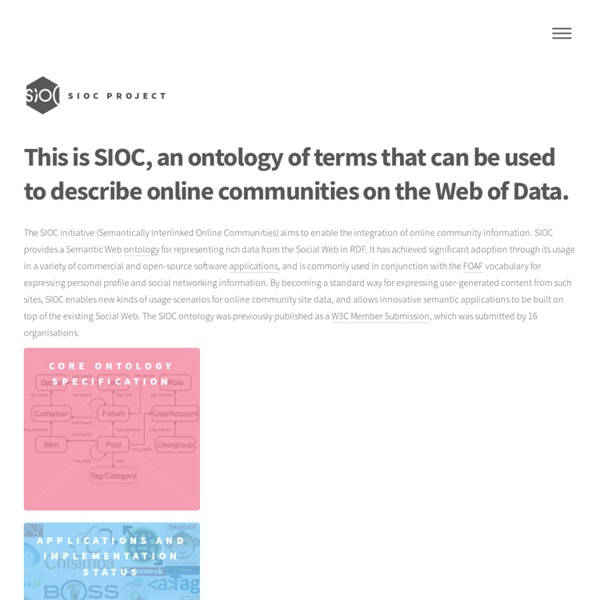



YAGO2 - D5: Databases and Information Systems (Max-Planck-Institut für Informatik) Overview YAGO is a huge semantic knowledge base, derived from Wikipedia WordNet and GeoNames. Currently, YAGO has knowledge of more than 10 million entities (like persons, organizations, cities, etc.) and contains more than 120 million facts about these entities. YAGO is special in several ways: The accuracy of YAGO has been manually evaluated, proving a confirmed accuracy of 95%. YAGO is developed jointly with the DBWeb group at Télécom ParisTech University.
PAUX Technologies GmbH - Start Academic Institution Internal Structure Ontology (AIISO) This Version [HTML] [RDF] Latest Version Previous Version Authors Rob Styles Nadeem Shabir Contributors Ian Corns Sarah Bartlett Chris Wallace Copyright © 2008 Talis Information Ltd This work is licensed under a Creative Commons License. Table of Contents Introduction Changes From Previous Version 2008-05-14 - semantic change by Rob Styles: "First cut of the ontology published" 2008-05-20 - semantic change by Rob Styles: "Corrected classes with more than one possible domain class to use owl:unionOf" 2008-05-20 - semantic change by Nadeem Shabir: "Added statement of responsibility for both knowledgeGrouping and organizationalUnit" 2008-09-25 - semantic change by Rob Styles: "Changed subclassing to subclass from foaf:Organization and deprecated organizationalUnit" 2008-09-25 - semantic change by Rob Styles: "Deprecated name in favour of foaf:name" Namespace name code Summary of Terms
Watson Semantic Web Search This is the Watson Web interface for searching ontologies and semantic documents using keywords. This interface is subject to frequent evolutions and improvements. If you want to share your opinion, suggest improvement or comment on the results, don't hesitate to contact us... At the moment, you can enter a set of keywords (e.g. Search options allow you to restrict the search space to particular types of entities (classes, properties or individuals) and to particular elements within the entities (local name, label, comment or any literal). Navigation in the results follows very simple principles. sign appears, it can be used to display additional information about the element it is attached with.
Le référencement sémantique en 22 ressources essentielles Le référencement sémantique en 22 ressources essentielles 5.00/5 (100.00%) 1 vote Le Web sémantique cherche à structurer toutes les données du Web — le contenu, les liens, et les transactions entre les personnes et les ordinateurs. Ce Web Sémantique, qui ouvre la voie au référencement sémantique, est en train d’émerger. C’est le web 3.0 Pour vous y retrouver voici, en apéritif, un petit guide non exhaustif de ressources et d’outils intéressants sur le sujet. Définition Formats de données et vocabulaires Il existe plusieurs formats de données ou de vocabulaires précis pour balisage sémantique. Google Knowledge Graph Outils et Geekeries À lire également : À propos de Louis Durocher Consultant principal et président d'Orénoque interactif, l'agence de référencement No1 de Montréal.
Schemapedia ResearchSpace Science in the Open Report on Persistent Identifiers [CERL] Hans-Werner Hilse and Jochen Kothe, Implementing Persistent Identifiers: Overview of concepts, guidelines and recommendations. London / Amsterdam: Consortium of European Libraries and European Commission on Preservation and Access, 2006. ISBN 90-6984-508-3. Traditionally, references to web content have been made by using URL hyperlinks. The report explains the principle of persistent identifiers and helps institutions decide which scheme would best fit their needs. The report was written by the Research and Development Department of the Goettingen State and University Library (Niedersächsische Staats- und Universitätsbibliothek Göttingen) at the request of the Advisory Task Group (ATG) of the Consortium of European Research Libraries.
LOCKSS The LOCKSS Program, based at Stanford University Libraries, provides libraries and publishers with award-winning, low-cost, open source digital preservation tools to preserve and provide access to persistent and authoritative digital content. Librarians need to know that the digital content they acquire today will not disappear when they cancel subscriptions, and that their electronic collections can be preserved and accessed by readers far into the future. Publishers need to know that the integrity of their web-based content will remain unchanged and available in perpetuity—even if their own website is no longer available. The LOCKSS Program was formed by the library community in response to these needs and concerns. Read more about LOCKSS collaborative digital preservation, post cancellation and perpetual access.